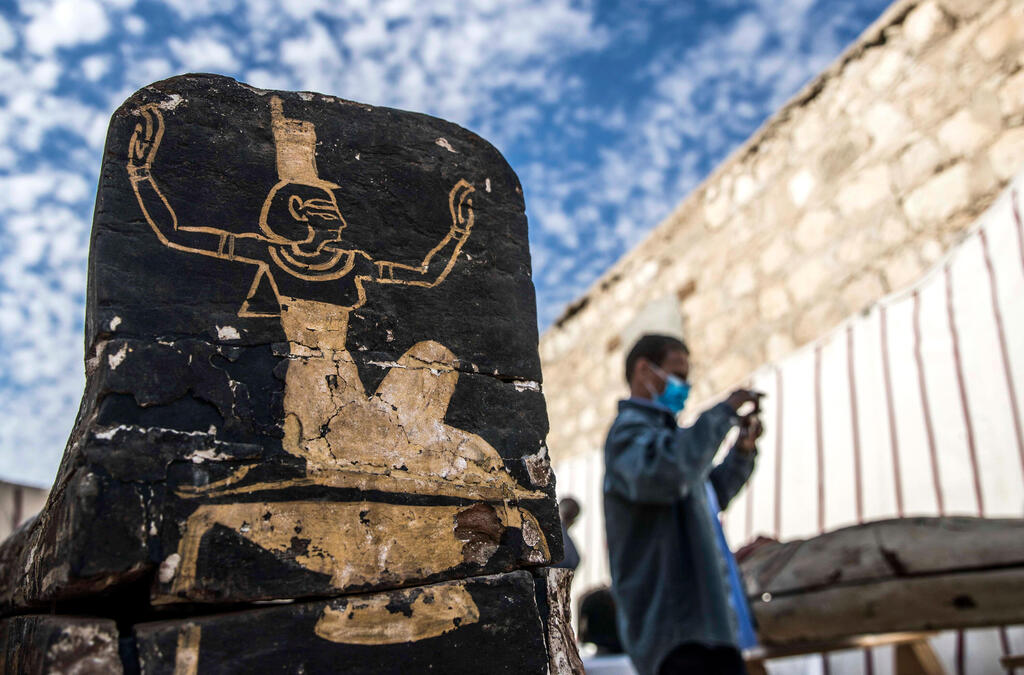Who built the pyramids? Is there any evidence of the Israelites' involvement? These are the type of questions that fascinate archaeologists, historians and simple ancient world enthusiasts like myself, a researcher in the field of Islam.
More stories:
Recently, I watched an intriguing documentary on Netflix titled Unknown: The Lost Pyramid, which reveals stunning new findings from excavations in the Saqqara area near Cairo. The film stars two archaeologists: Dr. Zahi Hawass, former minister of antiquities in Hosni Mubarak's government, and Dr. Mostafa Waziri, current head of Egypt’s Supreme Council of Antiquities.
Hawass states in the film that it's high time for the history of Egyptian pharaohs to be researched by Egyptians themselves, not by Western scholars. Both are advocates for returning Pharaonic treasures to their origin, that is, back to Egypt. That seems reasonable. So why could this actually be a bad thing?
Here's a bit of background. In the research world today, it's widely accepted that the pyramids were not built by Jews or aliens, but likely by local slaves or paid laborers. The pyramids were constructed many years before the Israelites ever set foot in Egypt. The Torah explicitly states which sites the Israelites built: "And they built for Pharaoh supply cities, Pithom and Ramses" (Exodus 1:11).
Unfortunately, Egyptologists (scholars studying ancient Egypt), a field that has seen significant progress since the 19th century, have found no evidence to support the story of the Israelites in Egypt. But there's no reason to lose hope – archaeology is full of surprises. In the film, Dr. Hawass suggests that the discovered pyramids represent only 30% of all Pharaonic structures, indicating there is still a considerable amount of work to be done.
Unlike the situation in Egypt, the archaeological findings in our region actually gradually confirm the details outlined in the Bible. For instance, the Gezer Calendar (found in 1908) revealed the agricultural work of the Israelites. The Mesha Stele (Jordan, 1868) confirmed the existence of the Eastern Transjordan tribes and the Kingdom of Israel. The Siloam Inscription (1880) uncovered a moment from the Assyrian siege of Jerusalem of the Kingdom of Judah. A century later, another inscription was found at Tel Dan that rocked the archaeological world, as it was the first time the "House of David" was mentioned.
So hope is not lost on discovering more and more evidence of the biblical Jewish past in the Land of Israel beneath the surface of the earth. What's required is patience and, primarily, motivation, which is exactly the issue at hand.
The motivation to unearth findings that corroborate the biblical text was once a significant component. The archaeologists of the 19th and early 20th centuries were often devout Christians who dreamed of finding hidden treasures from the Old Testament era.
Flinders Petrie, raised in a devout Christian household, found the Merneptah Stele during his excavation in Luxor in 1896, which featured the name "Israel." This artifact is associated with Merneptah, son of Ramesses II, who ruled until 1203 BCE. Following the deciphering of the discovery, he excitedly said that this inscription will be the most famous of all his discoveries.
However, the new Egyptian archaeologists, aspiring to shift Egyptology into Egyptian hands, have no motivation whatsoever to substantiate the biblical account. On the contrary, any such finding would only damage the Palestinian narrative. And either way, the goal of these Egyptian Egyptologists is to bolster Egyptian national pride.
Pharaonic history has become a significant foundation in constructing modern and secular Egyptian national identity. According to Dr. Hawass, President Abdel Fattah el-Sisi has contributed to the development of archaeology since his rise to power in 2013, even establishing a massive museum for Egyptian culture.
Egypt's Pharaonic heritage is akin to Lebanon's pride in its Phoenician heritage, Syria's in Zenobia's legacy in Palmyra, Iraq's in the Assyrian culture, pre-revolution Iran's in Babylonian culture, and so on.
In the film, Hawass jokes that he is Egypt's Indiana Jones. However, Indiana Jones, a childhood hero of mine, is an objective archaeologist who respects the preservation of antiquities by transferring them from oppressive and backward regimes (Nazis, Soviets) to a museum in the United States, the world's largest democracy. In contrast, Hawass and Zahi aim to return all Egyptian antiquities—including Pharaonic tombs and the Rosetta Stone—to Egypt, which, except for a brief period after the "Arab Spring," has never been a democracy.
According to Hawass's logic, a large-scale operation should be launched to return the treasures of Assyria, Babylon and the Pharaohs to Iran, Iraq, Syria, Lebanon and Egypt. Is that the right thing to do? From a moral perspective, there is some truth to the claim that these archaeological treasures were essentially stolen, and most of them now reside in Paris and London.
Hawass's assertion that their return to Egypt would boost tourism and aid economic recovery also makes sense. However, the shocking events that have unfolded in the Middle East over recent decades cast doubt: the destruction of antiquities by al-Qaeda and ISIS on the grounds of idolatry (such as the Buddha statues in Afghanistan, the tomb of Jonah in Mosul and the devastation of the city of Palmyra in Syria), along with looting in Egypt and Syria during the Arab Spring.
The approach of Waziri and Hawass is essentially an attempt to Islamize archaeology, which is particularly problematic when it comes to the study of the Bible.
Hawass has frequently expressed hostility towards Israel and Judaism. Waziri also claimed in 2016 that "the Jews labeled all the kings of Egypt as Pharaoh so they all would be considered evil." According to him, the Pharaoh mentioned in the Torah and the Quran was merely the personal name of one wicked king whose origin wasn't Egyptian at all (this claim is absurd because many Egyptian kings were called Pharaoh: meaning "Great House" – of the sun god).
Egyptology has so far only once discovered the name Israel, but a finding like Flinders Petrie's Merneptah Stele could indeed happen again, even in the near future, if the regime of Abdel Fattah el-Sisi encourages excavations. How would Egyptian researchers deal with findings relating to Jewish history if they come across them?
Before the peace agreement with Egypt and Israel’s withdrawal from Sinai, Israeli archaeologists discovered pottery at the Kuntillet Ajrud site in the peninsula’s east, featuring Hebrew writing from the 8th and 9th centuries BCE that bore the explicit name of the God of Israel. However, as per the terms of the peace agreement, Israel was obliged to return the findings to Egypt. In the upheaval of 2011, these artifacts were looted and their fate remains unknown.
 Dr. Yaron Friedman
Dr. Yaron FriedmanIn Israel, since November 1999, the Palestinian Waqf carried out excavations at Solomon's Stables, in the southeast corner of the Temple Mount, without any supervision or permission from the Antiquities Authority. The soil from these works and additional excavations on the Mount was discarded into the dustbin of history, so to speak, to waste disposal sites in the Jerusalem area such as the Kidron Valley.
Israeli researchers, who later worked on sifting through the soil at the disposal site, were appalled to discover findings from the First Temple period, such as pottery, arrowheads, weights and more, some of which bore Hebrew inscriptions from the era.
It's not just the disregard for historical findings that is troubling, but also the motivation to erase Jewish history in the Land of Israel, including the Temple. In modern Arabic literature, the term "Al-Haykal Al-Maz'um" - the Imaginary Temple, is increasingly used, a claim suggesting that the Temple and the location of the Ark of the Covenant, are nothing more than a new Jewish-Zionist invention. The conclusion is that entrusting Egyptology to local hands could indeed spell bad news for biblical researchers.
Dr. Yaron Friedman is a graduate of the Sorbonne University in Paris, a researcher, lecturer and Arabic teacher at the Department of Middle Eastern and Islamic Studies at the University of Haifa. His books The Nusayri - 'Alawis: An Introduction to the Religion, History and Identity of the Leading Minority,’ and ‘The Shīʻīs in Palestine’ were both published by Brill Publishers.



